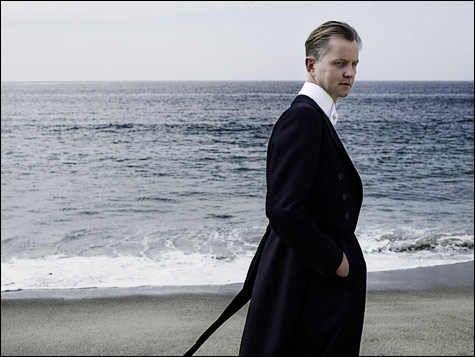 |
His blond hair slicked back, his tux faultlessly pressed, Max Raabe recalls Christopher Walken's Max Zorin in the James Bond flick A View to a Kill — and with lines like "Music has always been tied to destiny and personal tragedy. [Pause] Who cares? As long as you're not involved . . . ," he can seem almost as sinister. But Joel Grey's MC in Cabaret would be the more appropriate film analogy, since the 47-year-old Westphalian crooner is actually the leader of the Palast Orchester, which re-creates the cabaret experience of Weimar Republic Berlin in the 1920s and early '30s. This Saturday, the Celebrity Series will bring their "Heute Nacht oder nie" ("Tonight or Never") show — with everything from Kurt Weill ("Moon of Alabama") and Franz Lehár ("Dein ist mein ganzes Herz") to Cole Porter ("Just One of Those Things") and Irving Berlin ("Cheek to Cheek") — to the newly renovated Paramount Theatre on Washington Street for two sold-out performances. I catch up with Raabe — whose résumé includes portraying Mackie Messer in Die Dreigroschenoper ("The Threepenny Opera"), playing at the wedding of Marilyn Manson and Dita Von Teese, and covering Britney Spears's "Oops! . . . I Did It Again" — on tour in Portland, Oregon.
How and when did the Palast Orchester get started?
Oh, don't ask, 20 years. [Laughs] We are a student band. A bit older now, but still a student band.
How did you come up with the name "Palast Orchester"?
At that time, every cinema or dancehall was called "Palast." We have a glamorous name, but we never had our own Palast, of course. The name, but nothing behind it.
What brought you to Berlin?
I came in '85, to the University of the Arts, to study opera singing. Of course, what I do now is far away from opera. But I can use the technique, and now I have the wonderful gift to sing very silent. It is the best thing I can do, a wonderful thing for me.
And you wound up in an orchestra.
I started with a friend of mine, just with a piano and small, 20-minute programs. Later, in 1987 or so, we found some original orchestra arrangements from the '20s and '30s. So we asked a few musicians and people who were playing in jazz clubs and friends of ours, students mostly, to rehearse these arrangements, and maybe we would play for student balls or student dances. We rehearsed for nearly a year, and everybody was thinking that it would never happen. Just at the last second, we got an engagement for a ball — but not to play in the big ballroom, just to play in the foyer. That was our first paid job, and it was the last chance for the orchestra. And suddenly the big ballroom was empty, and everyone was in front of our small foyer stage. We did not have enough of a program, so we had to play the whole thing again. And at that moment, I realized that we would find an audience.